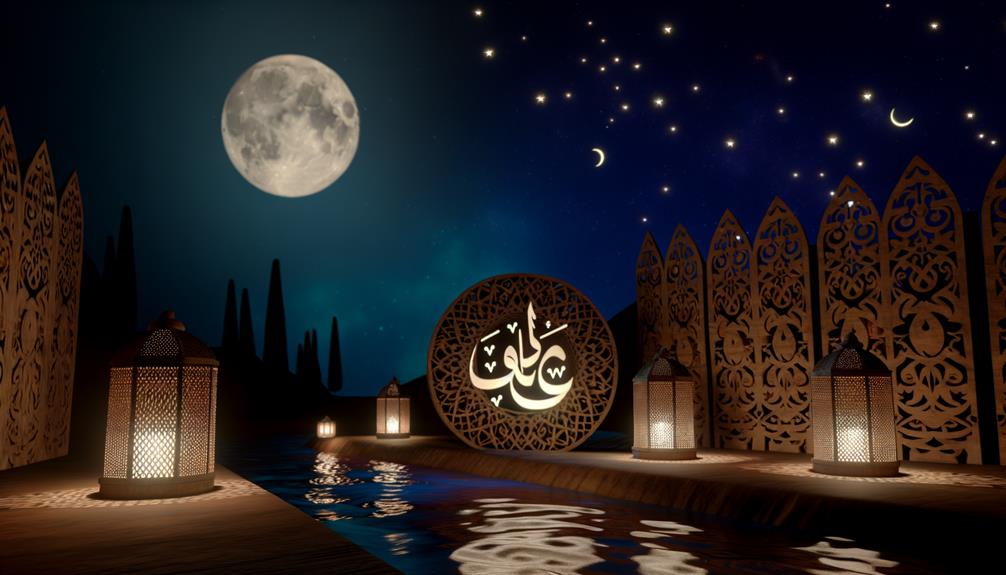Hamza Name Meaning in Urdu
The name Hamza in Urdu signifies strength and steadfastness. Its roots are in Arabic, reflecting qualities admired universally.
Historically, Hamza ibn Abdul-Muttalib, known as the Lion of Allah, plays a significant role in Islamic heritage due to his bravery and sacrifice. In the Urdu-speaking world, the name symbolizes these enduring values, linking to a legacy of integrity and moral courage.
Hamza is widely popular in Muslim-majority countries and holds a special place in Arabic-speaking communities. This rich cultural and historical background adds depth to the name.
Continue exploring to uncover the full significance of Hamza.

Key Takeaways
- Hamza in Urdu signifies strength and steadfastness, deriving from the Arabic root ḥ-m-z.
- The name is associated with bravery and integrity, reflecting universally admired qualities.
- Hamza ibn Abdul-Muttalib, known as the Lion of Allah, is a historical figure embodying these traits.
- It symbolizes moral principles, justice, and an unyielding spirit, resonating deeply in Urdu-speaking communities.
- The name maintains widespread popularity, representing a bridge between cultural heritage and modern identity.
Origin and Etymology
The name Hamza, deeply embedded in Arabic culture and language, signifies strength and steadfastness. When you explore its etymology, you'll find that Hamza originates from the Arabic root 'ḥ-m-z,' which conveys meanings related to firmness and resolution.
In Urdu, the name carries similar connotations, emphasizing a sense of courage and determination. It's a name that has transcended linguistic and cultural boundaries, encompassing qualities that are universally admired.
Historical Significance
How has the name Hamza carved its place in history, becoming synonymous with valor and heroism?
Hamza ibn Abdul-Muttalib, renowned as the 'Lion of Allah,' stands as a towering figure in Islamic history. He was a brave and fierce warrior, playing a pivotal role in the early battles of Islam, including the Battle of Badr.
Hamza's unwavering faith and relentless courage made him a revered figure among Muslims. His martyrdom at the Battle of Uhud further solidified his legacy of bravery and sacrifice.
Cultural Importance
In many cultures, the name Hamza carries a deep significance, symbolizing bravery and integrity that continues to inspire generations. When you encounter the name Hamza, you're often reminded of the historical figures who embodied these virtues.
This name is especially revered in Islamic communities, where it connects to the legacy of Hamza ibn Abdul-Muttalib, a renowned warrior and uncle of the Prophet Muhammad. His valor and moral fortitude serve as a timeless example for many.
Beyond religion, the name's cultural impact extends to literature, arts, and daily life, where it represents courage and steadfastness. Naming a child Hamza isn't just a familial choice but a cultural affirmation of enduring values.
Attributes of Hamza
Marked by bravery and unwavering integrity, the name Hamza evokes a profound sense of honor and strength. As you explore the attributes associated with Hamza, you'll find qualities that are both inspiring and admirable. Hamza signifies a person who is courageous in the face of adversity and possesses a resolute moral compass. This name is often linked with a strong sense of justice, loyalty, and an unyielding spirit.
| Attribute | Description | Example |
|---|---|---|
| Bravery | Fearless in challenging situations | Facing dangers head-on |
| Integrity | Adherence to moral principles | Always telling the truth |
| Honor | High respect and esteem | Earning respect in community |
These characteristics make Hamza a name that carries significant weight and respect.
Popularity and Usage
The name Hamza enjoys widespread popularity and usage, resonating deeply within various cultures and communities. You’ll find it commonly used in Muslim-majority countries, reflecting its strong Islamic roots. Many parents choose the name Hamza for its historical significance and noble associations, as it is the name of a close companion of the Prophet Muhammad. In addition, the popularity of the name has led to a heightened curiosity about its origins, with many individuals looking up the ‘kinza name meaning‘ to better understand its significance and etymology. Overall, the name Hamza continues to hold a special place in the hearts of many, crossing cultural and linguistic barriers.
It holds a special place in Arabic-speaking regions due to its historical significance and association with Hamza ibn Abdul-Muttalib, a revered companion of Prophet Muhammad (PBUH).
In Urdu-speaking communities, Hamza is cherished for its profound meaning and cultural resonance. You might also notice its popularity extending to Western countries, where it serves as a bridge between cultural heritage and modern identity.
Given its rich history and positive attributes, many parents choose Hamza for their children, ensuring the name continues to thrive globally.
Conclusion
In understanding the name Hamza, you've explored its rich origins, historical significance, and cultural importance.
Attributes associated with Hamza often include bravery and strength, making it a popular choice for many parents.
Imagine a young boy named Hamza, inspired by his namesake's valor, growing up to lead community initiatives with courage and compassion.
This illustrates how a name can shape and reflect one's identity, reinforcing its enduring appeal and meaningful legacy in Urdu-speaking cultures.






